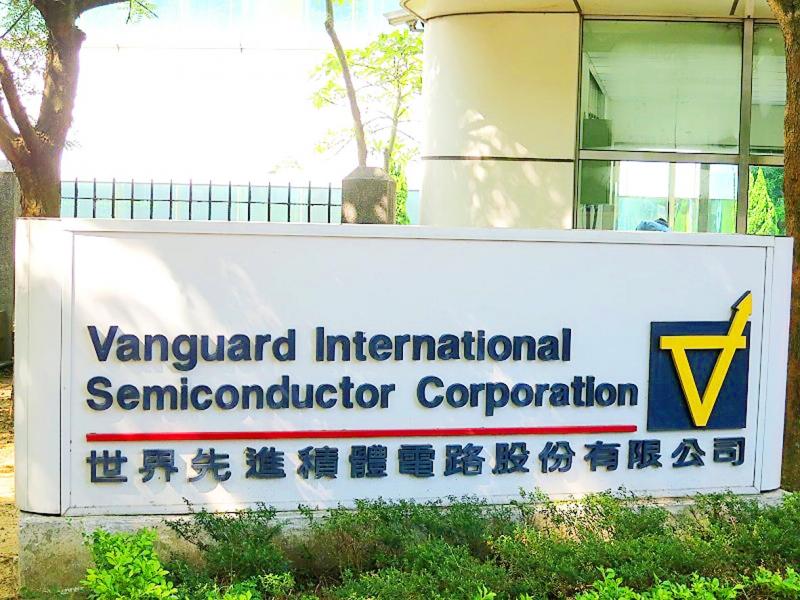Vanguard Semiconductor International Co (世界先進), which makes power management ICs and driver ICs for displays, yesterday said that net profit last quarter fell 1.4 percent from the previous quarter to NT$1.48 billion (US$49.27 million) as a newly acquired fab from GlobalFoundries Inc dragged down gross margin and prices.
Net profit was NT$1.5 billion in the fourth quarter of last year. Despite the quarterly decline, net profit rose 6.4 percent annually from NT$1.39 billion.
Earnings per share fell to NT$0.89 from NT$0.91 the previous quarter, but rose from NT$0.84 a year earlier.

Photo: Hung Yu-fang, Taipei Times
Gross margin dipped to 31 percent last quarter from 36.1 percent the previous quarter, as well as in the first quarter of last year, the company said in a statement.
The chipmaker said that it aims to limit the new fab’s erosion of its gross margin to within 5 percentage points this year.
Vanguard expects gross margin to improve to 31 to 33 percent this quarter, driven by robust customer demand and higher factory utilization of as high as 93 percent, up from about 90 percent a quarter earlier.
“At the moment, we still see our customers showing very strong demand through the second quarter,” Vanguard chairman Fang Leuh (方略) told investors during a teleconference.
“We have two months of [order] visibility until the end of the second quarter,” Fang said.
Vanguard said that it is cautious about customer demand in the second half of the year, given the sliding global economy and climbing unemployment rates worldwide.
“Uncertainty for the second half is huge,” Fang said.
Customers are not cutting orders on any downside risks yet, he added.
Vanguard expects growth momentum to boost revenue by 2 to 7.14 percent to a record high of between NT$8 billion and NT$8.4 billion this quarter, from NT$7.84 billion in the first quarter of this year.
It expects robust demand for power management ICs used in data centers, servers and work-from-home-related devices to fuel growth momentum, the company said.
Growth momentum would also come from driver ICs used in TV displays, as its Chinese display customers are gaining shares after South Korea’s Samsung Electronics Co exited the LCD market, it said.
However, driver ICs used in smartphone displays would be flat or would decline slightly this quarter from last quarter, due to customers’ inventory corrections, Vanguard said.
Power management ICs contributed 55 percent to Vanguard’s total revenue last quarter, while driver ICs for large-sized displays and small-sized displays accounted for 26 percent and 8 percent respectively.
The 8-inch fab in Singapore, which was acquired from GlobalFoundries, is operating normally and is not affected by the city-state’s disease prevention measures, as the semiconductor industry is considered a key industry for Singapore, Vanguard said.

TAKING STOCK: A Taiwanese cookware firm in Vietnam urged customers to assess inventory or place orders early so shipments can reach the US while tariffs are paused Taiwanese businesses in Vietnam are exploring alternatives after the White House imposed a 46 percent import duty on Vietnamese goods, following US President Donald Trump’s announcement of “reciprocal” tariffs on the US’ trading partners. Lo Shih-liang (羅世良), chairman of Brico Industry Co (裕茂工業), a Taiwanese company that manufactures cast iron cookware and stove components in Vietnam, said that more than 40 percent of his business was tied to the US market, describing the constant US policy shifts as an emotional roller coaster. “I work during the day and stay up all night watching the news. I’ve been following US news until 3am

UNCERTAINTY: Innolux activated a stringent supply chain management mechanism, as it did during the COVID-19 pandemic, to ensure optimal inventory levels for customers Flat-panel display makers AUO Corp (友達) and Innolux Corp (群創) yesterday said that about 12 to 20 percent of their display business is at risk of potential US tariffs and that they would relocate production or shipment destinations to mitigate the levies’ effects. US tariffs would have a direct impact of US$200 million on AUO’s revenue, company chairman Paul Peng (彭雙浪) told reporters on the sidelines of the Touch Taiwan trade show in Taipei yesterday. That would make up about 12 percent of the company’s overall revenue. To cope with the tariff uncertainty, AUO plans to allocate its production to manufacturing facilities in

Six years ago, LVMH’s billionaire CEO Bernard Arnault and US President Donald Trump cut the blue ribbon on a factory in rural Texas that would make designer handbags for Louis Vuitton, one of the world’s best-known luxury brands. However, since the high-profile opening, the factory has faced a host of problems limiting production, 11 former Louis Vuitton employees said. The site has consistently ranked among the worst-performing for Louis Vuitton globally, “significantly” underperforming other facilities, said three former Louis Vuitton workers and a senior industry source, who cited internal rankings shared with staff. The plant’s problems — which have not

COLLABORATION: Given Taiwan’s key position in global supply chains, the US firm is discussing strategies with local partners and clients to deal with global uncertainties Advanced Micro Devices Inc (AMD) yesterday said it is meeting with local ecosystem partners, including Taiwan Semiconductor Manufacturing Co (TSMC, 台積電), to discuss strategies, including long-term manufacturing, to navigate uncertainties such as US tariffs, as Taiwan occupies an important position in global supply chains. AMD chief executive officer Lisa Su (蘇姿丰) told reporters that Taiwan is an important part of the chip designer’s ecosystem and she is discussing with partners and customers in Taiwan to forge strong collaborations on different areas during this critical period. AMD has just become the first artificial-intelligence (AI) server chip customer of TSMC to utilize its advanced